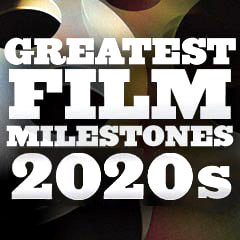
|
Milestones and Turning Points in Film History The Year 2024 |
![]()
(by decade and year) Introduction | Pre-1900s | 1900s | 1910s | 1920s | 1930s | 1940s | 1950s 1960s | 1970s | 1980s | 1990s | 2000s | 2010s | 2020s |
| Event and Significance | |
| A HarrisX poll reported that 34 percent of U.S. adults preferred to watch movies in theaters. Conversely, 2 out of 3 adults would rather wait for movies to be released on streaming services, and instead watch them at home. The poll showed that there was also very strong demand among content streamers - nearly half of consumers reported that they streamed movies weekly. The reasons provided for a preference in attending films in a theatre included the big-screen experience (59%), the quality of surround-sound systems (47%), fewer distractions than at home (39%), theatre's reclining seats (37%), theatre refreshments (32%), movie exclusivity in a theatre (30%), 3-D or IMAX technologies (30%), being with a live audience (26%), movie premieres or screenings (25%), and nostalgia (24%). The reasons for avoiding films in a movie theatre included the following: the cost of movie tickets (53%), the cost of theatre concessions-refreshments (42%), the comforts of home viewing (40%), "uninterested" (24%), sanitation and health reasons (23%), no restroom breaks (22%), audience distractions (19%), inconveniences of travel, traffic and parking (15%), selection of films (13%), inconvenient theatre locations (13%), limited availability or inconvenient showtime schedules (11%), and seat selection (8%). | |
| According to predictions by Deadline,
the domestic box-office was expected to drop in 2024 by $1-2 Billion
to a total of $8 Billion (compared to a total of about $9 Billion in
2023). Two major reasons accounted for the drop: (1) fewer films due
to the "broken rhythm" and "erratic pipeline of product," partially due
to the prolonged WGA and SAG-AFTRA strikes in 2023 that left only
107 wide titles and bumped many 2024 movies to 2025, and (2)
waning moviegoer sentiment, according to the National Research Group’s
(NRG) recent study reporting that 69% of moviegoers wanted more original
movies, and were suffering from "superhero fatigue." In fact, some moviegoers
felt that some strides were actually being made in reducing the number
of franchise films, although many releases set to be released in 2024
were still sequels or reboots/reimaginings. The study reported that Americans
weren't attending movies as frequently as they did pre-pandemic, off by close
to a third from pre-pandemic levels, mostly due to changed habits, inflationary
pressures, and an explosion in streaming. So in spite of ticket price
increases, the total box-office revenue intake was decreasing. It concluded
that "the challenge the industry faces is getting quality, theatrical
product out there on a continuous basis to consistently engage the habit
of moviegoing." Another major issue was that movie-going ranked the lowest on providing "a lot of value" for consumers’ money spent, when compared to other activities such as amusement parks, sporting events, and restaurants. Most customers said that they supported the move to reduce movie ticket prices and provide cheaper concession prices. Movie-going has mostly been challenged by the preference to stream movies at home vs. attending a movie theatre, bolstered by the comforts of in-home viewing, the increase in internet speeds, and the shortened window between theatrical and streaming releases. Many, however, still felt that there was nothing more important than the value of a theatrical release - that also boded well for a film's streaming success at a later date. |
|
| American film director Roger Corman died
at the age of 98. He was well-known as the extremely-prolific "King
of the B's." He had served as the producer and director of almost
500 independent, low-budget B films (horror, action,
westerns, teen movies and sci-fi mostly) and drive-in movies. In
the 1970s, he made
films for inner-city grindhouse theatres. In
the 1980s, he then pioneered direct-to-video films, and into the 1990s,
he produced Showtime late-night cable melodramas. Many young actors
got their initial 'break' in Corman films, including Jack Nicholson,
Ellen Burstyn, Robert De Niro and William Shatner. He also produced some
of the earliest films for budding directors, such as Francis Ford Coppola,
Martin Scorsese, Peter Bogdanovich, Joe Dante, Jonathan Demme, Curtis
Hanson, Penelope Spheeris, and Ron Howard. His legendary filmography stretched back to the mid-1950s, and included such films (only a sampling) as: Swamp Women (1955), The Day the World Ended (1956), It Conquered the World (1956), Not of This Earth (1957), The Undead (1957), Attack of the Crab Monsters (1957), Sorority Girl (1957), Machine-Gun Kelly (1958), A Bucket of Blood (1959), House of Usher (1960), The Little Shop of Horrors (1960), The Wasp Woman (1960), The Intruder (1961), The Pit and the Pendulum (1961), Tales of Terror (1962), The Premature Burial (1962), X - The Man With the X-Ray Eyes (1963), The Raven (1963), The Haunted Palace (1963), The Terror (1963), The Masque of the Red Death (1964), The Tomb of Ligeia (1965), The Wild Angels (1966), The St. Valentine's Day Massacre (1967), The Trip (1967), Bloody Mama (1970), Death Race 2000 (1975), Rock n’ Roll High School (1979), Battle Beyond the Stars (1980), Galaxy of Terror (1981), and Frankenstein Unbound (1990). His most notable films included a series from 1960-1964 of eight Edgar Allan Poe adaptations starring horror icon Vincent Price. He also made the original version of the black comedy Little Shop of Horrors (1960), and produced the Ramones' comedy Rock n' Roll High School (1979) and the cult sci-fi classic Battle Beyond the Stars (1980). |